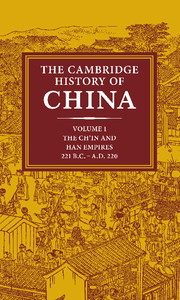Book contents
- Frontmatter
- Introduction
- 1 The state and empire of Ch'in
- 2 The Former Han dynasty
- 3 Wang Mang, the restoration of the Han dynasty, and Later Han
- 4 The conduct of government and the issues at stake A.D. 57–167
- 5 The fall of Han
- 6 Han foreign relations
- 7 The structure and practice of government
- 8 The institutions of Later Han
- 9 Ch'in and Han law
- 10 The economic and social history of Former Han
- 11 The economic and social history of Later Han
- 12 The religious and intellectual background
- 13 The concept of sovereignty
- 14 The development of the Confucian schools
- 15 Confucian, Legalist, and Taoist thought in Later Han
- 16 Philosophy and religion from Han to Sui
- Bibliography
- Glossary-Index
- Map 7 The Han empire, 143 b.c.
- Map 8 The Han empire, 108 b.c
- Map 9 The Han empire, a.d. 2
- Map 12 The Han empire, a.d. 140">
- References
12 - The religious and intellectual background
Published online by Cambridge University Press: 28 March 2008
- Frontmatter
- Introduction
- 1 The state and empire of Ch'in
- 2 The Former Han dynasty
- 3 Wang Mang, the restoration of the Han dynasty, and Later Han
- 4 The conduct of government and the issues at stake A.D. 57–167
- 5 The fall of Han
- 6 Han foreign relations
- 7 The structure and practice of government
- 8 The institutions of Later Han
- 9 Ch'in and Han law
- 10 The economic and social history of Former Han
- 11 The economic and social history of Later Han
- 12 The religious and intellectual background
- 13 The concept of sovereignty
- 14 The development of the Confucian schools
- 15 Confucian, Legalist, and Taoist thought in Later Han
- 16 Philosophy and religion from Han to Sui
- Bibliography
- Glossary-Index
- Map 7 The Han empire, 143 b.c.
- Map 8 The Han empire, 108 b.c
- Map 9 The Han empire, a.d. 2
- Map 12 The Han empire, a.d. 140">
- References
Summary
LITERARY SOURCES AND CLASSIFICATION SCHEMES
Although the historical and other texts include a variety of information concerning religious belief and intellectual developments during the Ch'in and Han periods, there is no definitive or systematic statement of a creed or a philosophical theory that permits a comprehensive analysis. Above all, there is no statement of many of the assumptions that were generally accepted and may be regarded as forming the background against which a number of writers and thinkers worked. However, we are fortunate that a number of texts, which derive from authors of different persuasions and which were compiled at varying intervals during the four centuries of the period, survive. Frequently enough, chapters of these works touch on the same problem or subject; where writers of opposing points of view appear to be acting on the same assumptions, these can probably be regarded as valid. A further valuable asset lies in the extent of critical comment that has survived, insofar as recurring protest or argument against certain views or practices testifies to their prevalence, provided that due allowance is made for the convictions and prejudices that motivated a writer to set down his thoughts.
The Ch'in and Han periods lacked a compelling intellectual personality or force comparable with, say, Confucius or Chu Hsi, or if we may turn elsewhere for a moment, Plato or Aristotle. But the fortunate preservation of a list of books that had been formed into the imperial collection at the beginning of the Christian era shows that a large body of writings existed at that time together with a considerable number of writers, even though only a small proportion of the works, estimated at less than a quarter, has survived.
- Type
- Chapter
- Information
- The Cambridge History of China , pp. 649 - 725Publisher: Cambridge University PressPrint publication year: 1986
References
- 4
- Cited by

